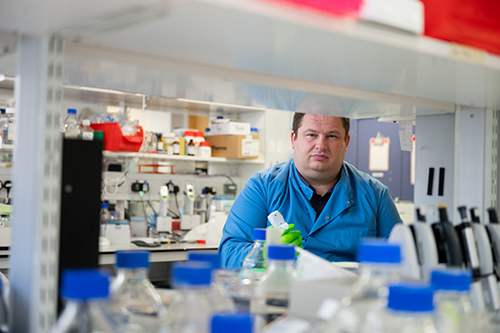ICAS Science

Assess students’ scientific thinking with the ICAS Science exam
In a world full of wicked problems like pandemics, climate change and food security, science is more important and more exciting than ever before.
In recognition of the subject’s educational importance, ICAS Science assessments are designed to provide an objective ranking of students’ performance based on the curricula for the relevant year. Science skills such as experimentation, empirical observation, logical reasoning, scientific analysis and critical thinking not only help you do well in STEM subjects — they are critical components of humankind’s most successful system for pursuing knowledge: the scientific method.
Start challenging your students and learning their science needs today, with our suite of Science tests for ICAS.

Skills tested for ICAS Science
Science has applications in countless fields of study and work, whether it’s looking at some of the smallest objects in the world in genetics and nanotechnology, or some of the biggest in geology and astrophysics. From the oldest disciplines such as medicine, to the newest like quantum mechanics, the universal language of chemistry to the murky depths of neuropsychology, opportunities abound for budding scientists. But even if you have no interest in working in a scientific field, the skills you learn in our ICAS Science exams will benefit your brain, your grades, and your ability to understand and navigate the world.
More than simply a Science competition, ICAS Science assessments consist of questions written and reviewed every year by expert educators. Papers are carefully graded to stimulate interest and learning across a wide range of abilities, including gifted and talented students. Students encounter a variety of questions on real scientific stimulus materials designed to test students’ scientific skills of:
Observing & Measuring
Interpreting
Predicting & Concluding
Investigating
Reasoning & Problem Solving
In turn, students receive a unique academic experience designed to challenge their abilities beyond the classroom, a greater understanding of where their strengths and areas of improvement lie, and recognition and encouragement of academic success. Get started with our Science tests today.
What students do in ICAS Science
The Introductory paper for the Science competition, created for students in the equivalent of Year 2, explores concepts such as light and shadow, properties of different materials, life cycles of plants and animals, and movement of objects in simple situations. Questions may require students to identify features of different seasons, compare the levels of liquids in different containers, draw conclusions based on simple graphs such as the growth of a child, or investigate the formation of shadows.
ICAS Science tests more sophisticated skills as school students progress through the years. For example, in Paper A (Year 3), students may be asked to determine how weather affects different regions, examine differences between living and non-living things, or select the most efficient machinery to achieve an outcome. Papers B and C (Year 4 and Year 5) explore topics such as cloud patterns, food webs, recycling, the production and use of sounds, simple electrical circuits and the function of experimental controls.
Finally, in Paper D (Year 6) of our Science competition, questions may require students to conduct fossil dating, distinguish between physical and chemical changes, investigate the resources needed for the survival of living things, determine the impact of pollution, or examine ranges of radio frequencies.
Science exam Papers E and F, for students in the equivalent of Year 7 and Year 8, assess advanced content on topics such as electrical circuits, forces and chemical processes, as well as new areas such as the particle model of matter, ecosystem interactions and transformation of energy. For example, questions may require students to identify landforms from contour maps, investigate advantages and disadvantages of renewable and non-renewable energy, identify different parts of the cell or calculate speed and acceleration from given formulas.
Science test Papers G and H (Years 9 and 10) set the foundation for the final years of schooling by challenging and extending students on a range of scientific topics. Students may be asked to generate hypotheses about weather, recognise problems associated with extraterrestrial investigations, apply scientific writing principles to experimental reports, understand random sampling methods in biology, or identify the effects of electric currents on humans.
Finally, Science competition Papers I and J (Years 11 and 12) similarly prepare senior school students for their final years of schooling in STEM subjects in a fun and challenging way, especially for students studying Chemistry, Physics, Biology and Earth and Environmental Science. Questions may require students to examine evidence relating to the formation of the universe, differentiate between accuracy and precision, use the law of constant proportion and the law of conservation, examine the ethics of using living subjects in experiments or measure macroscopic energy changes such as earthquakes and explosions. While senior high school students often set aside some of their previous extracurricular activities, ICAS tests provide valuable assessment experience and performance insights in the various popular Science subjects.
From taking an ICAS test, to impacting millions of people around the world during COVID. A Sydney teacher helped reset the trajectory of a Year 10 student’s life when she encouraged him to sit ICAS Science. His surprise perfect score revealed an extraordinary talent for problem-solving and led him all the way to becoming a world-leading expert in immunology who changed the course of the pandemic in 2020.
All ICAS test subjects
As the world’s global language and arguably one of the most important subjects of the Australian curriculum, English is a crucial building block for academic success.
As the foundation of STEM and a fundamental part of human thought and logic, Mathematics is a crucial building block for academic success.
In a world full of wicked problems like pandemics, climate change and food security, science is more important and more exciting than ever before.
In a digital world where technology underpins how we communicate, learn, work, and navigate our modern lives, understanding Digital Technologies is essential.
As our primary means of communication in academic, social and professional life, writing is one of the most fundamental skills to practise and master.
Spelling is more important than it seems — it lays a crucial foundation for literacy, communication and broader academic success.






